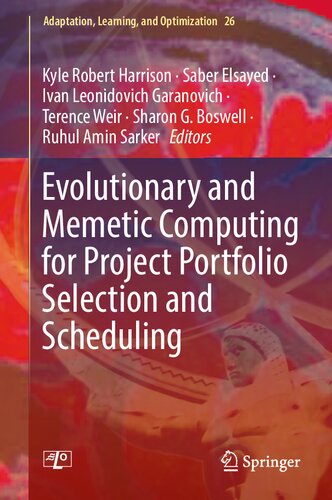

Most ebook files are in PDF format, so you can easily read them using various software such as Foxit Reader or directly on the Google Chrome browser.
Some ebook files are released by publishers in other formats such as .awz, .mobi, .epub, .fb2, etc. You may need to install specific software to read these formats on mobile/PC, such as Calibre.
Please read the tutorial at this link. https://ebooknice.com/page/post?id=faq
We offer FREE conversion to the popular formats you request; however, this may take some time. Therefore, right after payment, please email us, and we will try to provide the service as quickly as possible.
For some exceptional file formats or broken links (if any), please refrain from opening any disputes. Instead, email us first, and we will try to assist within a maximum of 6 hours.
EbookNice Team

Status:
Available4.5
5 reviewsThis book consists of eight chapters, authored by distinguished researchers and practitioners, that highlight the state of the art and recent trends in addressing the project portfolio selection and scheduling problem (PPSSP) across a variety of domains, particularly defense, social programs, supply chains, and finance. Many organizations face the challenge of selecting and scheduling a subset of available projects subject to various resource and operational constraints. In the simplest scenario, the primary objective for an organization is to maximize the value added through funding and implementing a portfolio of projects, subject to the available budget. However, there are other major difficulties that are often associated with this problem such as qualitative project benefits, multiple conflicting objectives, complex project interdependencies, workforce and manufacturing constraints, and deep uncertainty regarding project costs, benefits, and completion times.
It is well known that the PPSSP is an NP-hard problem and, thus, there is no known polynomial-time algorithm for this problem. Despite the complexity associated with solving the PPSSP, many traditional approaches to this problem make use of exact solvers. While exact solvers provide definitive optimal solutions, they quickly become prohibitively expensive in terms of computation time when the problem size is increased. In contrast, evolutionary and memetic computing afford the capability for autonomous heuristic approaches and expert knowledge to be combined and thereby provide an efficient means for high-quality approximation solutions to be attained. As such, these approaches can provide near real-time decision support information for portfolio design that can be used to augment and improve existing human-centric strategic decision-making processes.
This edited book provides the reader with a broad overview of the PPSSP, its associated challenges, and approaches to addressing the problem using evolutionary and memetic computing.